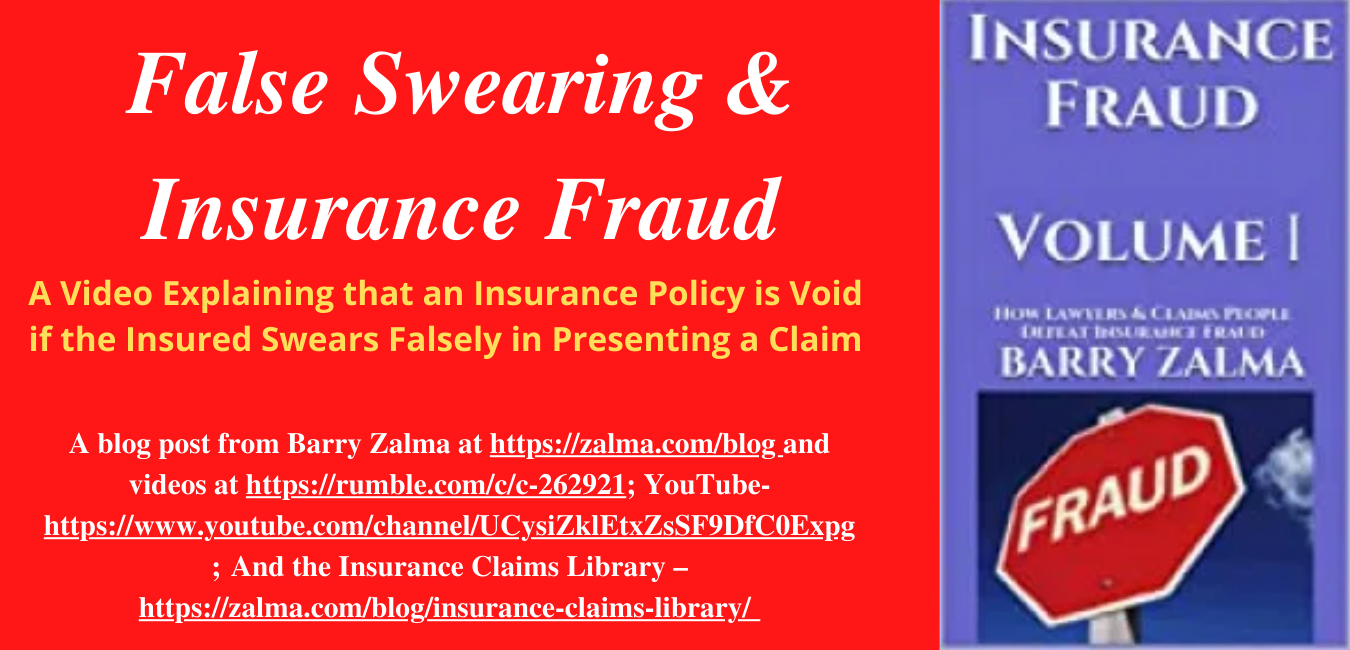-
News Feed
- EXPLORE
-
Pages
-
Groups
-
Events
-
Blogs
-
Marketplace
-
Offers
-
Jobs
-
Developers
False Swearing as a Defense to Insurance Fraud

A Video Explaining that an Insurance Policy is Void if the Insured Swears Falsely in Presenting a Claim
Read the full article at https://www.linkedin.com/pulse/false-swearing-insurance-fraud-barry-zalma-esq-cfe and see the full video at https://rumble.com/c/c-262921 and at https://youtu.be/zpk191Y254o and at https://zalma.com/blog plus more than 3900 posts.
In common language the “false swearing” provision of an insurance policy merely means that if the insured lies under oath the policy is void whether the lie is in a proof of loss or at an examination under oath. In Texas and Oklahoma, false swearing is explained this way:
Where an insured knowingly and willfully overestimates the value of property destroyed or damaged, the policy is voided and the insured’s right to recover is defeated.
The reason for the false swearing defense can be explained because it would be unjust to allow a claimant to misrepresent facts under oath that might lead to a valid defense and then allow him to escape the consequences of the falsehood simply because he had succeeded so well that the company was unable to establish the defense.
In common language the “false swearing” provision of an insurance policy merely relates to a lie under oath.
In Texas and Oklahoma, false swearing is explained this way: “Where an insured knowingly and willfully overestimates the value of property destroyed or damaged, the policy is voided and the insured’s right to recover is defeated.”[Summit Machine Tool Manufacturing Corp. v. Great Northern Insurance Co., 997 S.W.2d 840 (Tex. App. Dist. 3, 1999)].
Almost every policy that insures against the risk of loss of property requires the insured to submit a sworn proof of loss. The proof of loss must provide complete details regarding the property insured, the origin of the loss, and the value of the property claimed destroyed. A policy usually also requires the insured to give the insurer access to books and records to prove the claim. Where fraud is suspected, the insurer may demand that the insured be examined under oath. Significant deviations between the sworn proof of loss and the facts developed at an examination under oath can be the basis of a defense of fraud or false swearing.
The U.S. Supreme Court stated the rule, as follows:
A false answer as to any matter of fact material to the inquiry, knowingly and willfully made, with an intent to deceive the insurer, would be fraudulent. If it accomplished its result, it would be a fraud effected; if failed, it would be a fraud attempted. No one can be permitted to say, in respect to his own statements upon a material matter, that he did not expect to be believed; their materiality, in the eye of the law, consists in their tendency to influence the conduct of the party who has an interest in them and to whom they are addressed. Claflin v. Commonwealth Insurance Co., 110 U.S. 81, 3 S. Ct. 507, 28 L. Ed. 76 (1884).
© 2021 – Barry Zalma
We are 100% funded for October.
Thanks to everyone who helped out. 🥰
Xephula monthly operating expenses for 2024 - Server: $143/month - Backup Software: $6/month - Object Storage: $6/month - SMTP Service: $10/month - Stripe Processing Fees: ~$10/month - Total: $175/month
- Art
- Causes
- Crafts
- Crime
- Dance
- Drinks
- Film
- Finance
- Fitness
- Food
- Games
- Gardening
- Health
- Home
- Literature
- Music
- Networking
- Paranormal
- Other
- Politics
- History
- News
- Party
- Science
- Religion
- Shopping
- Sports
- SyFy
- Politically Incorrect
- Philosophy
- Theater
- Technology
- Wellness



